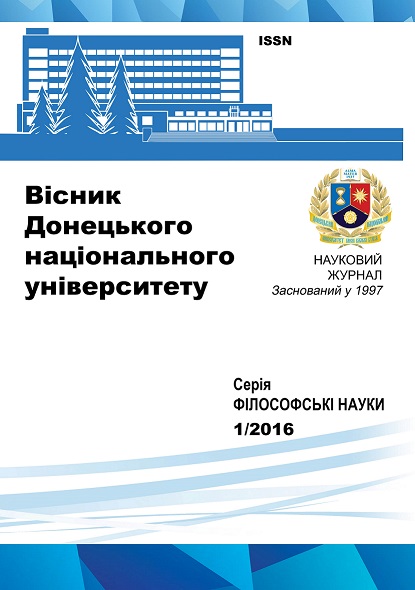Approaches of Understanding Modernity.
Keywords:
modern, self-reflection, rationality, technology, project of global developmentAbstract
In the article, the author is considering modern approaches to studies of Modernity as the only possible way of Modernity’s self-reflection by trying to close the lacuna in studies, which are mostly focused on the essence of Modernity, and not the ways of its discussion. In particular, several approaches have been considered, such as monolithic (tells of the unique state of Western modern worldview, which spreads across all civilizations) and plural (emphasizes the importance of colonial discourse and influence of Eastern cultures on the formation of modern worldview); institutional (offers to fix the presence of Modernity in case of formation of specific institutes like free market or civil society) and interpretational (finds Modernity in specific cultural answers to certain questions); optimistic (considers modernity a positive and perspective stage of mankind’s development) and pessimistic (applies to modernity as to the decay of traditional civilization or believes that the age of modernity has come to the end. By admitting the existence and legitimacy of different ways of classifying those reflections, it’s being emphasized, that only in their bounds discourse about Modernity is possible. On the other hand, analysis of Modernity’s self-reflection lets us talk about the transformation of modern worldview, Modernity itself and western mind in its claim to universality and global dominance. First stage of self-reflection was a development of metanarratives, which tell us of Modernity’s universal project and is classified by 5 features: universality (comprehends not certain situations or regions, but all historical, geographical and intellectual horizons and at the same time forms the image of future); invariance ( Totality of all empirical experience is submitted to the inner laws of these “stories”, all that we are able to register is a manifestation of these laws); teleology (these narratives describe goals and logic of not only the society but the History itself and determine the way to this goal); eschatology (this doctrine becomes a discourse about last hours and the salvation); metaphysics (all these metanarratives is a hermeneutics of the being itself, and not the clarification of a particularistic object, the being itself is speaking through them, in all its totality). As a substitute to the age of metanarratives came the age of Modernity and its Self-Identity, because the desire for universality and meta-positions were found to be inadequate. All we can say about Modernity is that it’s possible to tell about it within the frameworks of some special discourse about Modernity. When you come out of one discourse you immediately enter another one. After the deconstruction of metanarratives discourses about modernization, about industrialization, economic discourse, and discourse about secularization became arterial for Modernity’s analysis (and philosophic and humanist in general). In these discourses modern knowledge was explicitly looking for itself, incidentally trying to crystallize the discourse and itself on the one hand, and comprehending its own nature and challenging own bounds on the other. And analytics of particularistic discourses is the most effective way of development of integral discourse about Modernity, which will help to understand its essence from the perspective of the discursive approach.References
Хайдеггер Мартин. Гегель / М. Хайдеггер. – СПб.: Владимир Даль, 2015. – 322с.
Митчелл Т. Сцена «современности» / Т. Митечел // Неприкосновенный запас. – № 6 (098). – С. 123–139.
Анатолий Ахутин. Европа – форум мира / А. Ахутин. – К.: ДУХ I ЛIТЕРА. – 2015. – 88 с.
Браславский Р. Цивилизационный анализ и советский модерн / Р. Браславский, М. Масловский // Неприкосновенный запас. – 2015. – № 6 (098). – С. 45–55.
Культурні цінності Європи / За ред. Ганса Йоаса і Клауса Вігандта. – Пер. з нім. – К.: ДУХ І ЛІТЕРА, 2014. – 552 с.
Красицкий Я. Разум и Другой. Опыты по русской и европейской мысли / Ян Красицкий. – СПб.: РХГА, 2015. – 264 с.
Анкерсмит Ф. Р. Возвышенный исторический опыт / Франклин Рудольф Анкерсмит. – М.: Европа, 2007. – 612 с.
Витгенштейн Л. Логико-философский трактат / Людвиг Витгенштейн. – режим доступа: http://filosof.historic.ru/books/item/f00/s00/z0000272/st002.shtml
Гвардини Р. Гельдерлын. Картина мира и боговдохновленность / Романо Гвардини. – СПб.: «Наука», 2015. – 489 с.
Лапин Н. И. Фундаментальные ценности цивилизационного выбора в ХХІ столетии. Часть І. Человеческая цивилизация перед выбором конфигурации фундаментальных ценностей / Н. И. Лапин // Вопросы философии. – 2015. – № 4. – С. 3–15.
Юнгер Эрнст. Рабочий. Господство и гештальт / Эрнст Юнгер. – М.: Наука, 2002. – 546 с.
Гранин Ю. Д. «Нация» и «этнос»: эволюция подходов и интерпретаций в философии и науке ХVIII-ХХ столетий / Ю. Д. Гранин // Вопросы философии. – 2015. – № 7. – С. 5–17.
Александер Дж. Смыслы социальной жизни: Культурсоциология [Текст] / Дж. Александер; пер. с англ. Г. К. Ольховикова, под ред. Д. Ю. Куракина. – М.: Изд. и консалтинговая группа «Праксис», 2013. – 640 с.
Ассман Ян. Культурная память: Письмо, память о прошлом и политическая идентичность в высоких культурах древности / Ян Ассман, пер. с нем. М. М. Сокольской. – М.: Языки славянской культуры, 2004. – 368 с.

